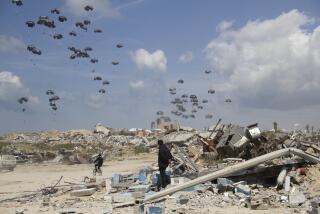Soviets Pledge Troops if U.N. Approves Attack : Gulf crisis: Moscow makes its first unequivocal vow to support a military operation against Iraq.
UNITED NATIONS — Soviet combat troops will participate in any military action against Iraq that is authorized by the U.N. Security Council, Foreign Minister Eduard A. Shevardnadze said Saturday.
“We will comply with any decision, with any resolution of the Security Council,” Shevardnadze said. “And that would include anything regarding the involvement of Soviet troops under the flag, under the auspices, of the United Nations.”
Deputy White House Press Secretary Roman Popadiuk said of Shevardnadze’s comments, “If the U.N. should move in this direction, we would, of course, welcome Soviet participation.”
Shevardnadze’s comment, recorded for broadcast today on the NBC-TV program “Meet the Press,” was the first unequivocal pledge by Moscow to contribute troops to a U.N.-ordered offensive to drive Iraqi occupiers out of Kuwait.
It marked a dramatic departure from Soviet President Mikhail S. Gorbachev’s statement to a joint press conference with President Bush after their summit meeting in Helsinki earlier this month that Moscow was staunchly opposed to the use of military force against Iraq even if current economic sanctions fail to force the Baghdad regime to withdraw from Kuwait.
In a speech to the U.N. General Assembly on Tuesday, Shevardnadze warned that war could break out in the Persian Gulf at “any moment.” He strongly implied that Moscow would support a U.N. force in the region, but he did not say flatly that the Soviet Union would send its own troops.
His latest comments came as Bush and Secretary of State James A. Baker III sought to enlist increased support for U.S. operations in the gulf during meetings with a long list of foreign leaders attending the opening of the General Assembly.
For instance, a Japanese official said Baker told Japanese Foreign Minister Taro Nakayama that, if the economic embargo does not drive Iraqi President Saddam Hussein out of Kuwait, “there should be a determination on the part of the United States and others to take further strong actions, including the military option.”
“We are of the same view as the United States that Iraq’s aggression threatens peace and stability . . . all over the world,” the Japanese official said.
He said that Nakayama said Japan’s post-World War II constitution would not permit Japan to send troops to fight Iraq. But he said Baker reported a growing consensus in the United Nations “for strong action.”
U.S. and Japanese officials said Bush urged Japanese Prime Minister Toshiki Kaifu to speed up the distribution of the $4 billion that Japan has pledged to support the U.S.-led confrontation with Iraq and to bolster struggling economies in the region.
Bush also asked Japan to increase the $3 billion a year that it contributes to support U.S. forces stationed in Japan.
Richard B. Solomon, assistant secretary of state for East Asia and the Pacific, said Bush put particular stress on the need to get money quickly to Egypt, Jordan, Turkey and other nations that have been hard hit by the echo effects of the economic embargo of Iraq.
Taizo Watanabe, Kaifu’s spokesman, said the Japanese leader agreed that Tokyo would do its part to prevent front-line states from wavering in their support of the economic sanctions.
Watanabe said that Japan is already contributing more to the support of U.S. troops than any other country where American forces are stationed.
Nevertheless, he quoted Kaifu as saying, “It goes without saying that Japan should continue to increase host nation support in the future.” He said no specific figures were cited on either side.
Bush and Kaifu also agreed to consult closely about possible use of the strategic petroleum reserves in each country to combat the spiraling cost of oil.
“It may be necessary to use some reserves to water down speculative price activity,” Watanabe said.
But he said Bush did not ask Japan to match his decision to release 5 million barrels of oil from the U.S. reserve.
Bush accepted Kaifu’s invitation to visit Japan early next year although a specific date was not fixed, U.S. and Japanese officials said.
While Bush and Baker were seeking additional economic support from Japan, Bush was urged to boost U.S. aid to hard-pressed Latin American economies.
Bush told President Cesar Gaviria of Colombia that he will soon send to Congress legislation providing trade concessions to the drug-impacted economies of the Andean region, the White House said in a written statement.
Bush promised to include cut flowers, Colombia’s most lucrative legal export, in the tariff-cutting legislation.
Gaviria said Bush made the promise after thanking Colombia for increasing its oil production to help offset the embargo against oil from Iraq and Kuwait.
President Violeta Barrios de Chamorro of Nicaragua said she asked Bush for an extra $200 million to revive her nation’s crumbling economy.
“We have inherited a bankrupt country,” she told reporters. “I am not at all shameful to recognize that I have asked for economic support.”
Related STORIES: A7, A8
More to Read
Sign up for Essential California
The most important California stories and recommendations in your inbox every morning.
You may occasionally receive promotional content from the Los Angeles Times.










